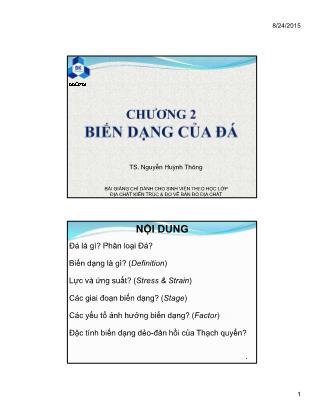Bài giảng Bản đồ và bản đồ địa chất - Chương 2: Biến dạng của đá
Đá là gì? Phân loại Đá?
Biến dạng là gì? (Definition)
Lực và ứng suất? (Stress & Strain)
Các giai đoạn biến dạng? (Stage)
Các yếu tố ảnh hưởng biến dạng? (Factor)
Đặc tính biến dạng dẻo-đàn hồi của Thạch quyển?
Bạn đang xem tài liệu "Bài giảng Bản đồ và bản đồ địa chất - Chương 2: Biến dạng của đá", để tải tài liệu gốc về máy hãy click vào nút Download ở trên
Tóm tắt nội dung tài liệu: Bài giảng Bản đồ và bản đồ địa chất - Chương 2: Biến dạng của đá

8/24/2015 1 GEOPET BÀI GIẢNG CHỈ DÀNH CHO SINH VIÊN THEO HỌC LỚP ĐỊA CHẤT KIẾN TRÚC & ĐO VẼ BẢN ĐỒ ĐỊA CHẤT TS. Nguyễn Huỳnh Thông 1 NỘI DUNG Đá là gì? Phân loại Đá? Biến dạng là gì? (Definition) Lực và ứng suất? (Stress & Strain) Các giai đoạn biến dạng? (Stage) Các yếu tố ảnh hưởng biến dạng? (Factor) Đặc tính biến dạng dẻo-đàn hồi của Thạch quyển? 2 8/24/2015 2 Đá là gì? Phân loại Đá? Rock is a combination one or more minerals. The Earth's outer solid layer, the lithosphere, is made of rock. 3 Biến dạng? Deformation describes the transformations from some initial to some final geometry Deformation of a rock body occurs in response to a force 4 ? 8/24/2015 3 Lực và Ứng suất? Force is Strength or energy as an attribute of physical action (change the body) or movement (F = m*a) Stress is a force applied over an area Uniform stress = Pressure is a stress wherein the forces act equally from all directions (X Y Z) (in fluid) Confining stress = weight of overlying rocks is a uniform stress (Z) 5 PHÂN LOẠI? If stress is not equal from all directions then we say that the stress is a differential stress. Three kinds of differential stress occur: · Tensional stress (or extensional stress), which stretches rock; · Compressional stress, which squeezes rock; and · Shear stress, which result in slippage and translation. 6 8/24/2015 4 CÁC GIAI ĐOẠN BIẾN DẠNG (Stages of Deformation) Elastic Deformation -- wherein the strain is reversible. Ductile Deformation -- wherein the strain is irreversible. Fracture - irreversible strain wherein the material breaks. 7 We can divide materials into two classes that depend on their relative behavior under stress Brittle materials have a small or large region of elastic behavior but only a small region of ductile behavior before they fracture. Ductile materials have a small region of elastic behavior and a large region of ductile behavior before they fracture. 8 8/24/2015 5 Clockwise Rotation about the z-axis . Translation Parallel to the Y axis 8/24/2015 6 Strain or Distortion Dilation 8/24/2015 7 Homogeneous Strain Homogeneous Deformation - Pure Shear . 8/24/2015 8 Homogeneous Deformation - Simple Shear Heterogeneous or Inhomogeneous strain Leads to distorted complex forms 8/24/2015 9 CÁC YẾU TỐ ẢNH HƯỞNG Temperature - At high temperature molecules and their bonds can stretch and move, thus materials will behave in more ductile manner. At low Temperature, materials are brittle. Confining Pressure - At high confining pressure materials are less likely to fracture because the pressure of the surroundings tends to hinder the formation of fractures. At low confining stress, material will be brittle and tend to fracture sooner. Strain rate ? Composition ? 17 BIẾN DẠNG GIÒN-DẺO CỦA THẠCH QUYỂN 18 8/24/2015 10 THANK YOU ! 19 CHUẨN BỊ: • CHƯƠNG 3: KIẾN TRÚC PHÂN LỚP
File đính kèm:
 bai_giang_ban_do_va_ban_do_dia_chat_chuong_2_bien_dang_cua_d.pdf
bai_giang_ban_do_va_ban_do_dia_chat_chuong_2_bien_dang_cua_d.pdf

